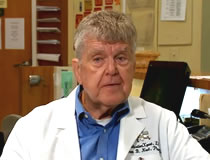August 30th, 2012
I Was Always Taught You Control The Pain, Not The Drug
Armon B. Neel, Jr., Pharm.D, CGP, FASCP
I was having lunch with a friend the other day, and he was upset because his wife had just had surgery on both feet with bones broken, pins inserted, and many stitches. She’d come home with a prescription for five days of pain medicine and orders to see the doctor again in 14 days. Why, he asked me, would you perform such extensive procedures where pain was assured and prescribe only five days of pain medicine and 14 days of antibiotics and not see the patient again for 14 days? What would she do for pain relief the other nine days?
I see this all the time, and I understand how the doctor might fear being reprimanded for the inappropriate prescribing of controlled substances. But here’s what I don’t understand: What is inappropriate in treating the pain from the beginning to the end of a patient’s bona fide health problem — especially a problem that results from work you’ve performed on a patient. Why wouldn’t the doctor know that the trauma inflicted on this patient would last long past five days? Why wouldn’t the doctor prescribe at least enough pain medication — and the appropriate pain medicine to stop the pain — to last until the patient’s next visit?
I recognize the stress for the doctor, and the current national problem with the abuse of prescription pain medicines, but as I see it, a patient with real pain has come to you for help. And the patient could care less about anything but getting relief.
Too often the physician refers the patient to a pain clinic merely to shift the potential liability to someone else. While I realize some of these pain clinics may be helpful, I can tell from patients who finally come to see me that some are just prescription-pain-medicine mills. Many patients tell me that they have to go back every month and pay $75 to $150 for an office visit just to be ushered into a treatment room where they receive a prescription for another month’s supply of their pain medicine. There are no questions about their condition, problems, or progress — just a statement that “we’ll see you again in 30 days.”
Now pardon my grammar, but that ain’t medicine.
Let me tell you a little story. A little over a year ago, a patient came to see me who was taking 30mg of Oxycontin (oxycodone), a highly controlled opiate pain medicine) four times a day. He was 84 years old, and he’d come to me because he was afraid that he was dying. After about a two-hour interview, I discovered that about 10 years ago he’d been prescribed esomeprazole (Nexium), a proton pump inhibitor, at 80mg per day — that’s twice the recommended dose — for severe gastric reflux problems. The Nexium didn’t help much. The physician then proceeded to put him on a number of medications to treat the health conditions caused by the outrageously excessive dose of Nexium: naprosyn (Naproxen) for arthritis; then diarrhea medicine; then medicine for ulcerative colitis; then anemia medication; and, finally, the Oxycontin for severe pain.
As the patient’s pain increased, the physician became uneasy about the size of the doses needed to control the pain and referred him to a pain clinic, which dutifully processed prescriptions for the Oxycontin. Over the ensuing year, the man’s pain then progressively got worse.
As I talked to the patient and evaluated his lab work, it became obvious to me that the pain was bone pain coming from the exorbitant dose of the Nexium leaching the calcium out of his bones. Over the past year we have stopped the offending drugs, stopped the leaching of calcium from his bones, and stopped the anemia, diarrhea, ulcerative colitis, and arthritis, which he didn’t have. The patient had unwittingly become an opiate addict simply because no one had taken the time to fully evaluate his medical information and get to the bottom of his problem.
This was quite an unpleasant experience for the patient and for me as we slowly backed out the Oxycontin. We finally were able to so, but here’s a case where the patient really victimized by the health professional who just kept on feeding his addiction. It was deplorable medical care.
Why didn’t the attending physician spend the time needed to diagnose the patient’s problem? Why didn’t the pain clinic try to find out why the Oxycontin was needed instead of just robotically generating a new prescription each month? Sure, we have a big national problem with people faking pain to obtain prescriptions for recreational drugs. But why did this patient suffer through more than two years of pain and agony before receiving any real help.
The answer is that no one took the time to stop, listen, and think about how to help this man get back to better health. And besides putting the patient through such agony for two years, look at what not taking the time to properly diagnose his problem cost the health-care system. Yes, it took hours to ferret out the problem and hours more to resolve the problem with this patient (and I charged for all the time because insurance companies won’t pay for my services), but I resolved the problem, saved the man’s life, and saved tens of thousands of dollars in future treatment and drug costs.
Yes, the system is broken. Business professionals and politicians won’t be able to fix it. That will take health-care practitioners putting their heads together, free from all egos and power struggles, and developing a comprehensive team approach to patient care that calls on the expertise of physicians, physicians’ assistants, nurse practitioners, clinical pharmacists, dietitians, physical therapists, occupational therapists, and all the other highly trained people in health care.
All with the mantra: Stop! Take the time to see, touch, and feel the patient . . . and do your job..
- August 15th, 2014
Voluntary Recall: Peritoneal Dialysis SolutionRead - September 22nd, 2012
Thalidomide Relieves Cough in Pulmonary FibrosisRead - August 17th, 2014
Bisphosphonates Increase Risk of Incident AFRead - December 9th, 2014
FDA Announces Voluntary Urgent Correction for INR TestingRead - September 21st, 2014
Antibiotic Recall Due to Particulate MatterRead
Geriatric Nutrition
Without good nutrition, positive drug therapy outcomes are very difficult to obtain, For the best in Geriatric Nutritional Information
Find out more Optima SolutionsContinuing Education
Each month we will post an analysis of specific aspects of government long-term healthcare regulations.
Find out more


